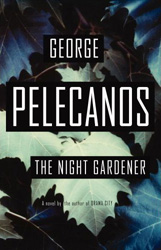 Buy it!: Click Here!
Buy it!: Click Here!
Publisher: Little, Brown and Company
Pages:384 pages
Author website: GeorgePelecanos.com
The Night Gardener is the best novel of the year.
This is what crime fiction is all about, human, dark, with glimpses of hope and real joy and sadness. Pelecanos has risen to the top of the class following the classic Derek Strange novels with two grand slams in a row.
The Night Gardner is dark. It’s dark and it’s lyrical and it’s ugly. And it really doesn’t give you something to hold onto in the end, just the very hint of redemption and hope that the world could be a better place. As a producer and writer for TV’s acclaimed The Wire and author of several other novels, all brilliant in their own right, Pelecanos knows how to set a scene and craft intense dialogue. He does just that in spades in this story of three men who are once again drawn together in order to find a killer. The novel begins in 1985 with the
The genius of the novel is in how futile and mundane the lives of these people are. Gus Ramone isn’t a haunted cop who goes after every criminal with a vengeance; the only thing that really matters to him is his family being happy and safe. Holiday’s life is in a tailspin and when he sees a chance at some kind of redemption, he jumps at it without really knowing what to do, until he reunites with
But the murder doesn’t dominate the book, Ramone has a family and he needs to support them. Parts of the book are narrated by
It isn’t until about half-way through the novel that you learn that while Ramone is a white man, his wife and children are black, and Pelecanos doesn’t ignore this. The racism against them isn’t cartoonish and loud, but subtle and ugly. His son Diego is struggling in his new school, a well-maintained one out in a suburb that celebrates diversity, until it "comes walking down the street on Saturday night." Diego has been singled out by school administrators as a potential problem for no other reason than the color of his skin, which angers Gus and makes him reconsider his decision to get his son away from the crumbling inner-city schools. Pelecanos writes these situations with a real anger as his own children are also black.
In the few scenes that
I was afraid of this novel, I really thought Pelecanos was going to sell out and write a serial killer thriller featuring Hard Gruff Men who can take a bullet and drink the same night, with snappy patter and a brilliant and charming killer on the loose. Shame on me, I should have known better.
Unfortunately, this novel isn’t perfect. Parts of the novel follow two gang-bangers on a crime spree and they have absolutely nothing to do with the plot until the end, and that reason is weak. It wouldn’t have taken anything away from the book if they had been written out and would have heightened it had those pages been devoted to one of the three protagonists.
I loved this novel though, and am eager for the next Pelecanos epic because he is only getting better, with hard as nails but real dialogue, a fantastic sense of place, and a real anger and passion that you don’t find as much anymore. He uses music not as a crutch or really to set a scene, but as a way to give a weight and history to the people inhabiting his world, and they all have a unique voice, be it a dixie drawl or an urban growl. In fact, I think my favorite thing was….wait, why are you still reading this? Go out and discover this work of art yourself.
9.8/10
NOT AS GOOD AS:
BETTER THAN: James Ellroy (I like Ellroy, but his characters never really engage me)
READ IF YOU LIKE: Ed McBain